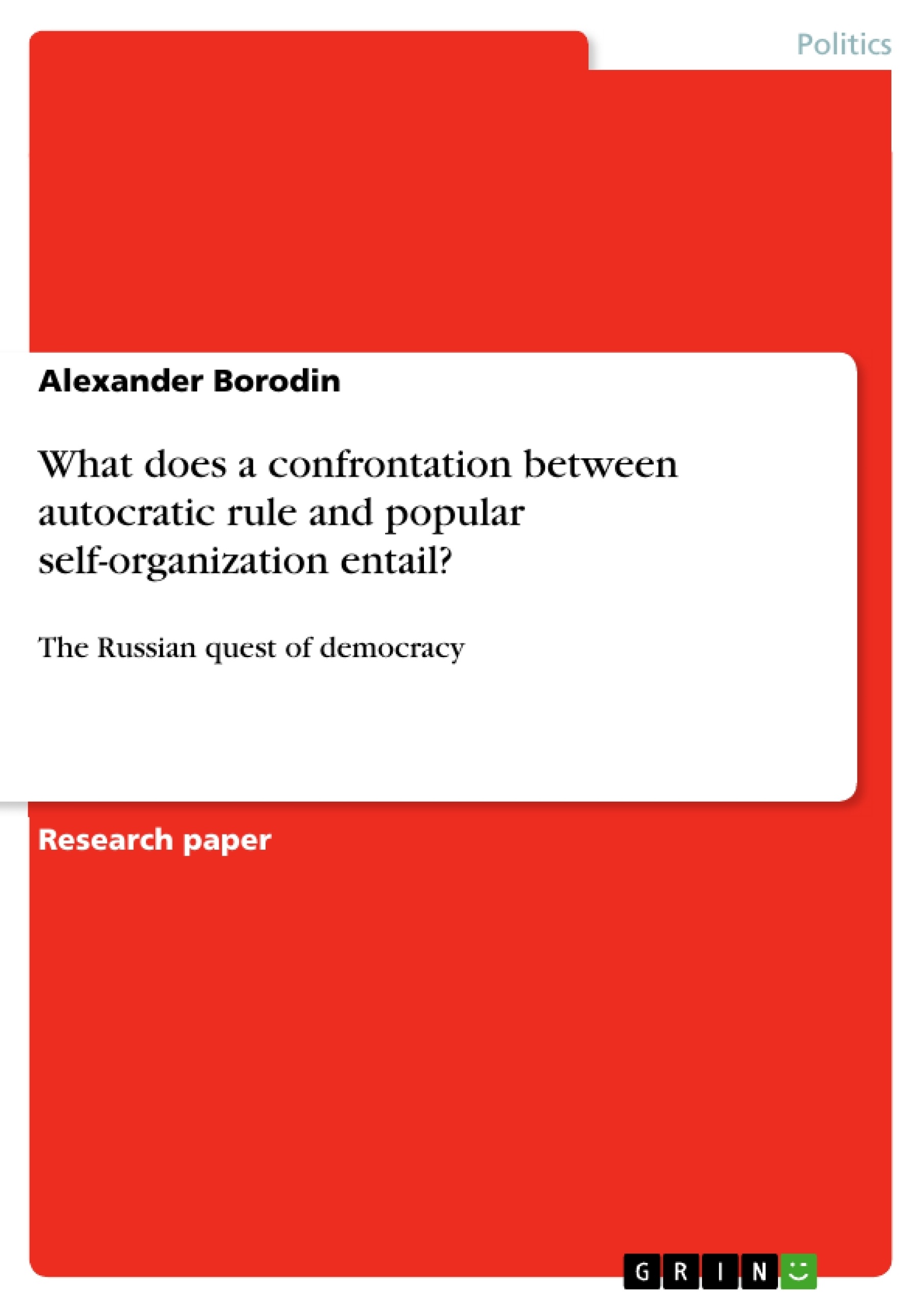Before forming any assessment regarding the presence of liberal democracy in contemporary Russia it is vital to investigate how conditions that either favour or harm the emergence of liberal democracy are fulfilled on an economic, social and political level. Using Robert Dahl's criteria of an “ideal democracy” (p. 33, Dahl, 1998) as a theoretical framework will serve us to contextualize Russia's current development to the notion of an ideal democracy. After balancing out the insights we gain throughout our investigation of the underlying features of the Russian system and the principles it relies on, we can then proceed to develop hypotheses with regard to the question of whether Russia is likely to become a liberal democracy in the short and long run. In what will follow, I shall argue that despite the considerable economic growth in its market economy, Russia's highly centralised government with a super-presidency combined with a still largely depoliticized society, which lacks indispensable underpinnings in terms of self-organization and belief in democratic values, imply that a transformation of society is a necessary antecedent to Russia becoming a genuine liberal democracy.
Inhaltsverzeichnis (Table of Contents)
- Introduction
- Conditions that Promote and Undermine Liberal Democracy
- Economic Conditions
- Political Conditions
- Social Conditions
- The Role of Enlightenment Values
- Features of Russian Capitalism that Promote Liberal Democracy
- Features of Russian Capitalism that Undermine Liberal Democracy
- Political Pluralism in Russia
Zielsetzung und Themenschwerpunkte (Objectives and Key Themes)
This paper investigates the conditions that either promote or hinder the emergence of liberal democracy in contemporary Russia. It utilizes Robert Dahl's criteria of an "ideal democracy" as a theoretical framework to contextualize Russia's development within the notion of an ideal democracy. The paper aims to determine whether Russia is likely to become a liberal democracy in the short and long run.
- The role of economic conditions in fostering or hindering liberal democracy.
- The importance of political pluralism and its implications for democratic development.
- The significance of social factors and civic engagement in shaping democratic institutions.
- The impact of the public's internalization of Enlightenment values on the legitimacy of the regime.
- The complex relationship between economic growth, state intervention, and the development of liberal democracy in Russia.
Zusammenfassung der Kapitel (Chapter Summaries)
This text explores the potential for Russia to become a liberal democracy by examining key factors that contribute to or detract from the emergence of such a political system. It begins by outlining the conditions that promote or undermine liberal democracy, emphasizing the importance of economic factors, political pluralism, social capital, and the internalization of Enlightenment values. The text then delves into Russia's economic development, highlighting both the positive aspects of market liberalization and the negative consequences of state intervention, corruption, and dependence on natural resources.
Schlüsselwörter (Keywords)
Liberal democracy, Russia, economic development, political pluralism, civil society, Enlightenment values, state capitalism, corruption, oligarchy, market economy, democratic institutions.
Frequently Asked Questions
What theoretical framework is used to analyze Russia's democracy?
The paper uses Robert Dahl's criteria of an "ideal democracy" as the theoretical framework for its investigation.
What is the central argument regarding Russia's potential for liberal democracy?
The author argues that a transformation of society is necessary before Russia can become a genuine liberal democracy, due to a highly centralized government and a depoliticized society.
How does the Russian economy affect its democratic development?
While market growth exists, factors like state intervention, corruption, and a dependency on natural resources undermine the development of democratic institutions.
What social conditions are missing in contemporary Russia according to the text?
Russia lacks indispensable underpinnings in terms of popular self-organization and a widespread belief in democratic values.
What role do Enlightenment values play in this context?
The internalization of Enlightenment values by the public is seen as a key factor for the legitimacy and emergence of a liberal democratic regime.
- Arbeit zitieren
- Alexander Borodin (Autor:in), 2012, What does a confrontation between autocratic rule and popular self-organization entail?, München, GRIN Verlag, https://www.grin.com/document/199500



